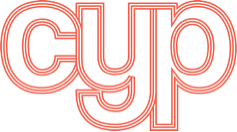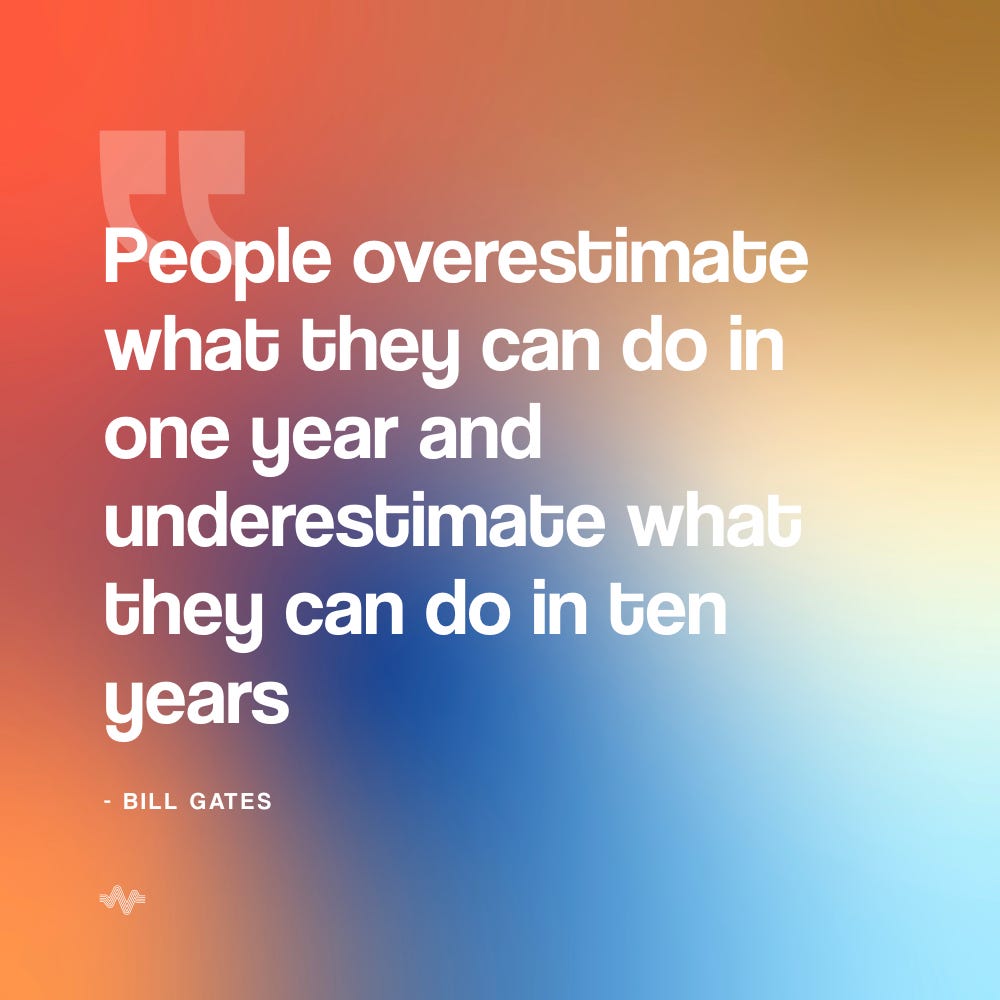Check your Pulse #29
the 20s, psychedelics, and product zeitgeist fit

Welcome to the 29th edition of Check your Pulse, a tech and startups newsletter designed to make you feel human. I try to make this one of the best emails you get each week. If you’re enjoying it and know someone who’d like this sort of thing in their inbox, they can sign up here.
Happy new year and new decade, friends!
Can you believe that ten years ago, we didn’t have Instagram? Or Uber, or Airbnb? Just ten years ago Blackberry did $20B in revenue and was competing with Apple for market share. Last year they did $0.9B in revenue.
It’s easy to look at the tech giants today — Apple, Google, Microsoft, Facebook, and Amazon — and assume that they will remain unchallenged by 2030 (Ben Thompson at Stratechery wrote an excellent post on the subject this week).
A common theme throughout history is that progress happens too slowly for people to notice while setbacks happen too quickly for people to miss.
There’s been quite a few prediction posts making rounds on the Internet about what the 20s will look like— Alex Danco’s predictions for the 2020s, Fred Wilson’s What will happen in the 20s, Frank Chen’s life in 2030, and The Generalist’s predictions for the decade.
Unsurprisingly, my favorite is Morgan Housel’s, 2020 - what a time to be alive, where he argues “the difference between an optimist and a pessimist isn’t usually over substance. It’s the time frame they’re looking at. Problems are easier to spot today, but progress is almost always more powerful over time.”
I won’t take a bet on when, but here’s a combination of what I think and hope will happen in the 20s:
The dominant business model of the Internet, based on extracting and exhausting our attention spans, will lose favor as people will transition from free social media platforms that turn us into addicted extremists to niche subscription services built on platforms like Substack or Podia. This will mark a transition from audiences to communities, from reach to depth, from algorithmic-driven feeds to human curators. Our digital social environments will feel very different, re-emphasizing private interactions and helping us build the smaller communities we all crave. Email newsletters grow to become the next big social network. This creates opportunities for platforms built to support those creators, like Letterwell (which I discovered on ProductHunt earlier this week). Instagram becomes the next QVC. They’ve been quietly laying the groundwork to become a shopping paradise. The combination of limited loyalty for incumbents, information overload, and an abundance of choice means the long tail of sellers/D2C brands that breed trust will continue to proliferate. The primary economic beneficiaries of this commerce renaissance will be the platforms (Instagram, Shopify, FBA, etc…) not the brands. Instagram ditches like counts and other consumer apps follow, shunning ego analytics in favor of features that reflect our happiness offscreen. The 2020s will see out cognitive dissonance strained further as we allow voice assistants, wearables, and cameras everywhere to permeate our lives and we come to terms with the fact that advanced technology and privacy are incompatible. Sustainability will become the definitive status symbol, because if we don’t get on top of the climate crisis, nothing else matters. This creates opportunities for brands like For Days (where I am an investor) and aggregators like Package Free, as well as software solutions that help businesses and consumers manage and measure emissions (Wren/Pachama). The paradox/trade-off between our dual desire for sustainability and convenience will make things slow. People want a better world but it’s hard to reconcile this with our penchant for laziness and instant gratification. Movement on the regulatory front will be required to make real progress. We will finally reckon with the consequences of inequality — the top 10 percent of humanity having 90 percent of the planet’s wealth. The only way to fix the problem is to transfer wealth and/or increase income. Token-enabled business models will emerge as a a feasible way for tech companies to spread the wealth and align their users behind their success. Marketplaces will evolve from being intermediaries that take a commission on each transaction (causing participants to resent them) to being collectively owned platforms that reward those that contribute (making users more committed). Aligning everyone on the way up (shared equity, unity) will represent an important paradigm shift. We will see more widespread adoption of policies like Universal Basic Income that break the job loop which currently has people trapped. Too many of our smartest minds are working on trivial tasks and spending their time in corporations where they feel invisible. They're bored, unchallenged, and under-employed. I believe freeing these people is the most important opportunity of our lifetime.
I’ll expand on this in another issue, but for now, welcome to the 20s. There’s so much to look forward to.
🙏🏼
Sari


If you’re a founder, this thread is for you. Even the most “successful” startups often feel like they’re falling off a cliff. 🧗🏾♂
If you haven’t been listening to Dolly Parton’s America, you should. It’s a fascinating, nine-part series on Dolly’s life with an emphasis on her unique status as a universally (conservative, liberal, gay, straight, American or Kenyan) beloved icon. You don’t need to love her music to love this series. 📽
I echo everything Paul Graham says on Having Kids. I hate to say this, because being ambitious has always been a part of my identity, but having kids may make one less ambitious. It hurts to see that sentence written down. I squirm to avoid it. But if there weren't something real there, why would I squirm? The fact is, once you have kids, you're probably going to care more about them than you do about yourself. And attention is a zero-sum game. 👨👦
I love Zak the Baker’s (my fave bakery in Miami) reflection on the new year and his aspiration to get better, not bigger. 🥖
Three theories for why you have no time via The Atlantic. The household economy of cooking, cleaning, washing, and grocery shopping has changed dramatically in the past 100 years with a plethora of labor saving appliances, but its evolution tells an illuminating story about why half a century of labor-saving technology does not appear to have saved the typical housewife even one minute of labor. In short, better technology means higher expectations, and higher expectations create more work. ⌛
WeWork cofounder Adam Neumann has just been cast in the upcoming show chronicling the company's journey and he'll be played by Nicholas Braun (aka Cousin Greg on HBO's "Succession." ) 💯
A list of companies that took environmental and political stands in 2019. 👏🏼
The emotional journey of creating anything great via John Do 👇🏽

A powerful article on relationships and resentment. 💏
Douglas Abrams’ Rules of Technology are spot on: 1) Anything that is in the world when you’re born is normal and ordinary and is just a natural part of the way the world works 2) Anything that’s invented between when you’re fifteen and thirty-five is new and exciting and revolutionary and you can probably get a career in it 3) Anything invented after you’re thirty-five is against the natural order of things. 🚀

Does your company have Product zeitgeist fit? 🧠
While it’s nice to look back and celebrate what worked, it’s also useful to look back at the biggest flops of the decade to understand what didn’t work and reflect on why. 📉
Earnest Capital, a new type of fund providing funding for bootstrappers, shares their investment memo. It’s a great analysis on the evolution of software and opportunities today. 👍🏼

Psychedelic drugs are undergoing a surprising renaissance — once viewed as “drugs of abuse”, regulators and investors are now coming around to their potential uses in treating depression, addiction, and the existential fear of death faced by many people with cancer. In a podcast episode on the Tim Ferris show, Michael Pollan (author of popular books like The Omnivore’s Dilemma) argues that mental healthcare in the U.S. is broken and psychedelics may just save the day. According to Michael, over the next decade, as psychedelics become decriminalized in many Western places, their use will grow primarily through microdosing, not high-dose experiences, and used to treat conditions like depression, alcoholism, anxiety, OCD, etc… One of the most interesting startups in the space is Mindbloom, which offers legal, clinician-prescribed ketamine therapy. It starts with an online candidate assessment for indications of depression or anxiety. If you qualify for the treatment, you book a visit where you’re given a Ketamine tablet that dissolves under your tongue and dive inwards on a 1 hour introspective journey. Whether this becomes mainstream or not remains to be seen, but it’s exciting to see new approaches to mental health treatment come to market.




If you’re wondering who’s behind this newsletter:
My name is Sari Azout. I am a design-thinker, strategist, and early stage startup investor at Level Ventures and Rokk3r. My mission is to bring more humanity and creativity to technology and business.
Want more?
Follow me on Twitter, Medium, and Instagram.
Know a founder i should meet?
Drop me a note at sari@level.vc
If you're enjoying this newsletter, I'd love it if you shared it with a friend or two. You can send them here to sign up.
And if you come across anything interesting this week, send it my way! I love finding new things to read through members of this newsletter.
Thanks for being here!
